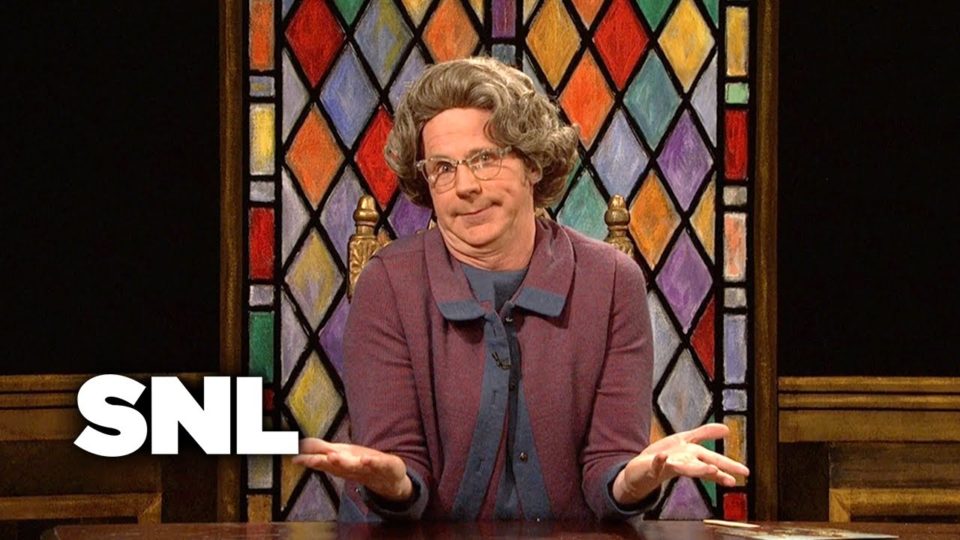
Scene from Church Lady, from the American comedy show Saturday Night Live
To describe the faithful, McWhorter rejects the term “wokester” [de tradução quase impossível, mas algo como “militante”] as being very loaded (although I would point out that both “woke” and “politically correct” started out as terms used by the group, not hostile outsiders) and instead refers to practitioners of the new religion as “the elect” in his sly and poignant book “Woke Racism: How a New Religion Has Betrayed Black America.”
McWhorter emphasizes that the new obsession with racial grievances such as
fons et origo [fonte e origem, em latim] of all social diseases is not as a religion; It’s a religion, period. It is useless to argue with his adherents because their dogmatic views are fundamental to his self-image. This religion is not properly defined as “politics” or as a “social justice movement”. The solemn reverence of the faithful – New York Times critic AO Scott called Ta-Nehisi Coates’ book “as essential as water or air” – is all around us.Those who disagree that, for example, white privilege/supremacy is the main problem in the United States in 2022 are simply denounced – “SATAN?!” – the way Dana Carvey’s character carol used to describe all the suspicious phenomena in the “The Church Lady” chart on Saturday Night Live [se você souber inglês, vale buscar no YouTube. Os quadros são hilários]. When followers of this religion consider something “problematic”, you must understand that they are saying it is blasphemy. “This ideology stipulates that one’s primary moral duty is to combat racism and the racist,” writes McWhorter.
This is why nice, normal, highly intelligent people can be found on social media demanding the destruction of a total stranger’s livelihood for this or that passing remark: heresy must be ruthlessly exterminated in the name of a religion that professes tolerance. “The progress of anti-racism… has moved from the concrete political activism of a Martin Luther King [Jr.] to the faith-based commitments of a Martin Luther.” That hurt. “Progress” can be a lot like moving the calendar backwards by 500 years old.
The new religion has an origin myth: the absurd assertion of the 2020 project of New York Times
that the American Revolution was fought to preserve slavery. It has a Bible of three testaments: “Between the world and me”, by Coates [livro lançado no Brasil pela Editora Objetiva], “White Fragility”, by Robin DiAngelo, and “How to be anti-racist” [lançado no Brasil pela Ed. Alta Cult], by Ibram X. Kendi. Vigorously practices judging heretics on Twitter.
Interestingly, because those of us on the right are not within reach of the new church in the first place, we can hardly be exiled the way a New York Times editor or New York Magazine columnist can be. We’re goddamn heathens anyway, so we don’t count. (Reason enough to join our cause, I say.) McWhorter notes that the new religion is even corrupting and, in some cases, engulfing the old religion. In 2020, he writes: “American Christianity in many places began a slow transition to a new ‘woke’ version of oneself”, with white privilege being positioned as a sin of soul-rotting.
Casting an angry look at critical race theory, McWhorter dismisses it as “a fragile, performative ideology that… linear reasoning, traditional legal theorizing, and even Enlightenment rationalism. We must favor the idea that the “history” of an oppressed race constitutes the absolute truth…” How exhausting, how limited it is to reduce the entire black experience to the possibility that someone could end up like George Floyd. “When ‘identity’ is thought of as central to intellectual, aesthetic, and moral meaning, the range of interests inevitably narrows,” he writes. “As such, the woke religion discourages genuine curiosity.”
Treating the new religion as harmless because it supposedly at least tries to promote the position of black people is a fallacy. This ideology causes serious harm to blacks: “it teaches us that we are the first people in the history of the species for whom it is a form of heroism to embrace the slogan ‘Yes, we can’t!'”More specifically, the woke religion completely ignores the harm done to black citizens by black criminals when it demands that police funding be cut, or the harm done to black students when it ignores higher rates of misbehavior and crime by black boys in school to produce a more statistically compatible narrative.
In higher education, affirmative action creates a perpetual mismatch between black students and their schools that leads many to frustration and failure; a black student who could do perfectly well at a second-tier law school finds himself unable to keep up with the lightning-fast pace of an elite institution and ends up dropping out. “The harm to black people is so varied and rampant that anyone committed to this religion and calling it an anti-racist on top of that walks with a certain amount of shame,” writes McWhorter.
‘Woke Racism’ is, like virtually everything McWhorter writes, notable for its courage; he knows that a cool head and the methodical application of logic are as welcome in a discussion of racism as a heat wave on a ski slope. He calmly advises readers to simply accept that they will be considered racist (or, if they are black, self-hating traitors) for opposing this religion. However, we must back off. Instead of cringing and promising to acknowledge sin, you should think of yourself as “Galileo being told not to make sense because the Bible doesn’t like it.” From courage derive the other virtues. ‘Woke Racism’ isn’t as important as water or air, but it’s essential reading all the same.
© National Review. Published with permission. Original in English


